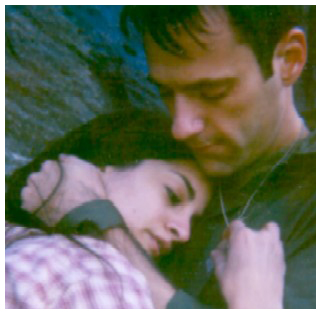Acclaimed SCREENPLAY Seeks PRODUCER
HOW HIS BRIDE CAME TO ABRAHAM
“When those who must not Love”
WASHINGTON REPORT
New York Reading of “How His Bride Came to Abraham” Evokes Yearning for Peace
By Jane Adas
WASHINGTON REPORT ON MIDDLE EAST AFFAIRS
November 2005, pages 56-57
MIGHT A play be a force for reconciliation? Those fortunate enough to experience Karen Sunde’s “How His Bride Came to Abraham” may well think so. The audience attending a July 7 reading of the play at Quaker House in New York reacted, as the author intended, with a profound “yearning for peace.”
The setting is Israel’s former “security zone” in south Lebanon, where Abe, an Israeli soldier on patrol, is wounded by a roadside bomb. Frightened and separated from the others in the ensuing confusion, Abe hears the voice of his dead grandmother, a Holocaust survivor, reciting Psalm XXIII (“The Lord is my shepherd”). He asks her spirit to send a Shabbat Angel. A young, keffiyeh-clad woman who is possibly a resistance fighter approaches and, in spite of the enormous distrust between them, takes Abe to her hut, where she bathes and dresses his wounded foot and offers him a meal.
Neither can leave until morning. It is too dangerous for the Lebanese woman to negotiate the mined fields in the dark and Abe, in radio contact with his patrol, assures them he is safe enough to wait until daylight to be rescued. The two talk. She is more reticent than he, but finally tells Abe her name is Sabra. When she begins to tell him what has happened to her family, Abe’s initial reaction is, “Those are war stories,” but then he is able to hear and comfort her.
In the morning, Sabra wakes before Abe and puts on a suicide belt. Seeing her, Abe is furious but, perhaps, manages to talk her out of it. His rescue patrol is coming closer and she must leave at once. The patrol spots her. Over Abe’s “Don’t shoot, don’t shoot,” a volley of gunfire is heard. The stage darkens and the play ends with Psalm XXIII recited simultaneously in Hebrew, Arabic and English.
The roles seem written for the actors who performed them. Maya Serhan (Sabra), the granddaughter of Palestinian refugees forced into exile in 1948, lived for a time in Lebanon. Israeli-born Amir Babayoff (Abe) was a soldier who served in both Lebanon and the occupied territories. Performing in the play, he told Sunde, helped him deal with feelings he had been unable to articulate.
Although Sunde wrote “How His Bride Came to Abraham” more than a decade ago and published it in 2001 (Plays by Karen Sunde, Broadway Publishing, Inc.), she said, “it feels as though the reason I wrote it was for now.” A Midwesterner transplanted to New York, Sunde is an award-winning actress and author of 23 plays, which have been performed Off-Broadway, in regional tours and in 10 countries and seven languages. Of them all, she feels “Abraham” is the most essential.
Sunde had traveled to the Middle East to research a U.N. commission for a play about peacekeeping missions for the U.N.’s 45th anniversary. Later, a producer suggested she write an Israeli-Palestinian play. Fearing that such a play would only be a staged debate, her reaction was, “That’s impossible.” That night, however, unable to sleep, the basic outline came to her: two innocent enemies meet in the midst of conflict and discover the humanity in each other.
